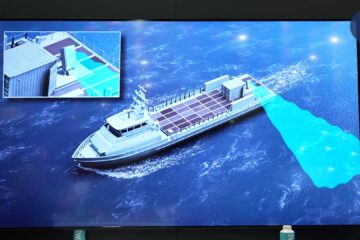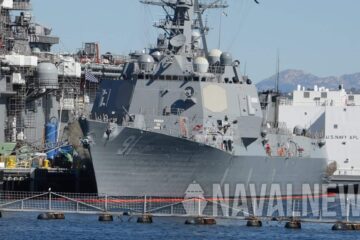Austal USA press release
In August this year Puerto Rico was the first EPF to perform and successfully complete integrated sea trials – combining builder’s trials and acceptance trials into one at-sea event – returning to port flying a broom at her mast indicating a “clean sweep” of the tests the ship and her crew performed in the Gulf of Mexico.
Austal Chief Executive David Singleton said the EPF continues to impress stakeholders, with a flexible platform that is delivering multi-mission capability to the U.S. Navy’s global operations.
“Puerto Rico joins the growing fleet of EPFs constructed by Austal USA and proudly serving with the U.S. Navy in locations as diverse as the USA, Middle East and South East Asia,” he said.
“The EPF continues to impress the U.S. Navy and indeed many other navies around the world with the genuine flexibility and operability of the platform.”

The Spearhead-class EPF, a 103 metre high-speed aluminium catamaran, provides high-payload transport capability to U.S. combatant commanders around the world and has quickly become known as ‘the pickup truck’ of the fleet; with 10 EPFs in service, including seven deployed internationally.
The Austal-designed EPF’s large flight deck, open mission bay and habitability spaces provide an opportunity to conduct a wide range of missions – from maritime security operations to humanitarian aid and disaster relief missions. The ship’s flexibility also allows it to support potential future missions such as special operations, command and control, and primary medical operations. With its ability to access small, austere and degraded ports with minimal external support, the EPF provides unique options to fleet and combatant commanders.
Two additional Spearhead-class EPFs remain under construction at Austal USA’s shipyard. Newport (EPF 12) is in final assembly, while construction recently began on the future USNS Apalachicola (EPF 13) at Austal USA’s state-of-the-art module manufacturing facility (MMF).
In addition to the EPF program, Austal is under contract to build Independence-class Littoral Combat Ships (LCS) for the U.S. Navy. Ten LCSs have been delivered, while an additional six are in various stages of construction.






